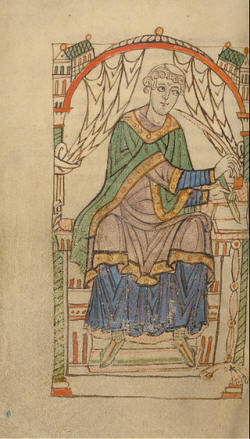

Queer
Places:
Via Sant'Anselmo, 66, 11100 Aosta AO
Canterbury Cathedral, 11 The Precincts, Canterbury, Kent CT1 2EH
 Anselm of Canterbury OSB (1033/4–1109), also called Anselm of Aosta after his birthplace
in Italy and Anselm of Bec after his monastery, was an Italian Benedictine monk, abbot, philosopher and theologian of the Catholic Church, who held the office of Archbishop of Canterbury from 1093 to 1109. After his death, he was canonized as a saint; his feast day is 21 April.
As archbishop, he defended the church's interests in England amid the Investiture Controversy. For his resistance to the English kings
William II and Henry I, he was exiled twice: once from 1097 to 1100 and then from 1105 to 1107. While in exile, he helped guide the Greek bishops of southern Italy to adopt Roman rites at the Council of Bari. He worked for the primacy of Canterbury over the bishops of York and Wales but, though at his death he appeared to have been successful, Pope Paschal II later reversed himself and restored York's independence.
Beginning at Bec, Anselm composed dialogues and treatises with a rational and philosophical approach, sometimes causing him to be credited as the founder of Scholasticism. Despite his lack of recognition in this field in his own time, Anselm is now famed as the originator of the ontological argument for the existence of God and of the satisfaction theory of atonement. He was proclaimed a Doctor of the Church by a bull of Pope Clement XI in 1720.
Anselm of Canterbury OSB (1033/4–1109), also called Anselm of Aosta after his birthplace
in Italy and Anselm of Bec after his monastery, was an Italian Benedictine monk, abbot, philosopher and theologian of the Catholic Church, who held the office of Archbishop of Canterbury from 1093 to 1109. After his death, he was canonized as a saint; his feast day is 21 April.
As archbishop, he defended the church's interests in England amid the Investiture Controversy. For his resistance to the English kings
William II and Henry I, he was exiled twice: once from 1097 to 1100 and then from 1105 to 1107. While in exile, he helped guide the Greek bishops of southern Italy to adopt Roman rites at the Council of Bari. He worked for the primacy of Canterbury over the bishops of York and Wales but, though at his death he appeared to have been successful, Pope Paschal II later reversed himself and restored York's independence.
Beginning at Bec, Anselm composed dialogues and treatises with a rational and philosophical approach, sometimes causing him to be credited as the founder of Scholasticism. Despite his lack of recognition in this field in his own time, Anselm is now famed as the originator of the ontological argument for the existence of God and of the satisfaction theory of atonement. He was proclaimed a Doctor of the Church by a bull of Pope Clement XI in 1720.
Anselm is important for the evidence he represents that the hostility of some Christians to homoerotic relationships has not always been typical of the institutional church. He has two claims in particular to attention from modern gay and lesbian Catholics. First, he is one of a band of notable medieval clerics who although personally celibate, exhibited a clear homoerotic sensibility, whose affectionate letters to his band of intimate male friends contribute to what John Boswell has described as a “medieval flowering” of a gay subculture, which was not again equalled until the latter part of the twentieth century. He is also important as an early protector of gay men from the rising tide of intolerance that came to dominate the later medieval and renaissance periods, intolerance that persevered today, and is widely mistaken for something which is somehow inherent to the Christian faith.
My published books: